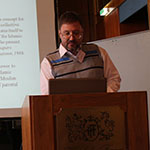Euroacademia Conferences
 Europe Inside-Out: Europe and Europeanness Exposed to Plural Observers (9th Edition) April 24 - 25, 2020
Europe Inside-Out: Europe and Europeanness Exposed to Plural Observers (9th Edition) April 24 - 25, 2020 Identities and Identifications: Politicized Uses of Collective Identities (9th Edition) June 12 - 13, 2020
Identities and Identifications: Politicized Uses of Collective Identities (9th Edition) June 12 - 13, 2020 8th Forum of Critical Studies: Asking Big Questions Again January 24 - 25, 2020
8th Forum of Critical Studies: Asking Big Questions Again January 24 - 25, 2020 Re-Inventing Eastern Europe (7th Edition) December 13 - 14, 2019
Re-Inventing Eastern Europe (7th Edition) December 13 - 14, 2019 The European Union and the Politicization of Europe (8th Edition) October 25 - 26, 2019
The European Union and the Politicization of Europe (8th Edition) October 25 - 26, 2019 Identities and Identifications: Politicized Uses of Collective Identities (8th Edition) June 28 - 29, 2019
Identities and Identifications: Politicized Uses of Collective Identities (8th Edition) June 28 - 29, 2019 The European Union and the Politicization of Europe (7th Edition) January 25 - 26, 2019
The European Union and the Politicization of Europe (7th Edition) January 25 - 26, 2019 7th Forum of Critical Studies: Asking Big Questions Again November 23 - 24, 2018
7th Forum of Critical Studies: Asking Big Questions Again November 23 - 24, 2018 Europe Inside-Out: Europe and Europeanness Exposed to Plural Observers (8th Edition) September 28 - 30, 2018
Europe Inside-Out: Europe and Europeanness Exposed to Plural Observers (8th Edition) September 28 - 30, 2018 Identities and Identifications: Politicized Uses of Collective Identities (7th Edition) June 14 - 15, 2018
Identities and Identifications: Politicized Uses of Collective Identities (7th Edition) June 14 - 15, 2018
Reinventing Islamic “Tradition” in Crimea: Ethnicity, Religion, Politics
-
-

-
Presentation speakers
- Oleg Yarosh, National Academy of Science, Kiev, Ukraine
- Download presentation
Abstract:
The present day Islamic revival in the Crimea goes hand to hand with nation-building processes. Following the minority situation, the claims of Crimean Tatars to regain their historical heritage, properties, land and re-establish of semi-statehood in form of national autonomy are challenged by the Russian majority and local authorities. The main reason for this rejection is that Tatars want to Islamize Crimea; establish “Islamic State” etc. Thus, we have to clarify the issue of how Islamic experiences of Crimean Tatars are engaged in these claims. Do we have any sufficient reasons to speak about “political Islam” in Crimea”? At the same time, some contemporary Islamic religious institutions argue that they are reviving Islamic tradition and that they represent “traditional” Crimean Tatar’s Islam. Meanwhile, so-called “independent communities” and international network institutions promote so called “pure Islam”. As a result we have to deal with a stereotype of confrontation between so called “traditional” and “network” Islam. Therefore, the purpose of this presentation is twofold. Firstly, it aims at in-depth study of contemporary Islamic revival in Crimea in the context of identity politics. This will allow us reconstruct Crimean Tatar’s “Islamic locality”. Secondly, we will present a comparative analysis of the formation of an “Islamic locality” in the Crimea and the development of Muslim Diasporas and the” translocal Umma” in Western Europe. The present day Islamic revival in the Crimea goes hand to hand with nation-building processes. Following the minority situation, the claims of Crimean Tatars to regain their historical heritage, properties, land and re-establish of semi-statehood in form of national autonomy are challenged by the Russian majority and local authorities. The main reason for this rejection is that Tatars want to Islamize Crimea; establish “Islamic State” etc. Thus, we have to clarify the issue of how Islamic experiences of Crimean Tatars are engaged in these claims. Do we have any sufficient reasons to speak about “political Islam” in Crimea”? At the same time, some contemporary Islamic religious institutions argue that they are reviving Islamic tradition and that they represent “traditional” Crimean Tatar’s Islam. Meanwhile, so-called “independent communities” and international network institutions promote so-called “pure Islam”. As a result we have to deal with a stereotype of confrontation between so called “traditional” and “network” Islam. Therefore, the purpose of this presentation is twofold. Firstly, it aims at in-depth study of contemporary Islamic revival in Crimea in the context of identity politics. This will allow us reconstruct Crimean Tatar’s “Islamic locality”. Secondly, we will present a comparative analysis of the formation of an “Islamic locality” in the Crimea and the development of Muslim diasporas and the” translocal Umma” in Western Europe.
-
Related Presentations


















